- Home
- Alexandrea Weis
The Nicci Beauvoir Collection: The Complete Nicci Beauvoir Series Page 4
The Nicci Beauvoir Collection: The Complete Nicci Beauvoir Series Read online
Page 4
“Friends? Funny, we don’t seem like friends. You and I just met.”
“People can meet only once and be friends for a lifetime. Friendship doesn’t always have to be in the form of a physical presence. As long as you have space for someone in your heart, they will always be your friend.”
“Did your aunt say that, too?” I was no longer comfortable sitting beside him. I got up and walked over to one of the bookshelves.
“No, my father did. He was an expert at leaving people behind. But that’s not the topic at hand. We were talking about your dreams.” He stood up and approached me. “Are you going to tell me about them?”
At that moment, there was a knock on the door. We both turned to see Sammy standing, or attempting to stand, in the entrance to the library.
“Well, thish is where ya been hidin’ yusef.” Her accent was thicker as she wobbled up to David. I backed away from the two of them.
“I was lookin’ all over fo’ ya, honey.” Sammy pitched forward and David caught her before she hit the floor.
I watched him trying to collect her limp body into his arms. He looked up and his eyes darted about the room, purposefully avoiding mine. I could see the humiliation in his face.
The room began to close in on me. I couldn’t watch this scene any longer, and ran out of the library. Once downstairs, I nearly tripped over Colleen on my way out of the patio door from the hall. She was hunched over the side of the steps, leaning against a potted fern.
“Colleen, are you all right?”
I couldn’t understand her garbled response. I lifted her up, as best I could, and dragged her to the car.
Before I could pull around the pile of cars that blocked me in on the driveway, I saw a tall figure emerge from the front door of the house. I drove over Sammy’s front lawn to the street. There was no point in stopping to see if it was David. There was nothing left to say.
Chapter 3
June marks the beginning of the full heat of summer in New Orleans. If you are lucky enough to survive the day indoors, you are almost always greeted by an afternoon thunderstorm. The rain brings a brief moment of relief to the wilted city.
One particularly hot morning, my professor canceled one of my summer semester classes. I found myself with no constructive way to fill the time until my afternoon class began. I had no intention of boring myself even further in the library, so I decided I would take the morning off and do something I hadn’t done in quite some time. I headed to the French Quarter.
The French Quarter was the tourist hot spot of New Orleans. For the locals, the Quarter can be an escape from the hectic life of the city, built around the old town. The Quarter is our link to the past. It’s possible to lose yourself amid the cobblestone sidewalks, the antiquated architecture, and the thousands upon thousands of tourists.
I made my way to my favorite spot in the heart of the Quarter. It’s where the Mississippi river curves, giving New Orleans it’s nickname, the Crescent City. I had always felt the river to be a source of strength for me. Despite whatever upheaval may be occurring in my life, the river was always there, always flowing. I stood for a while at the railing overlooking the swirling muddy water, then decided to set out for Jackson Square.
I slowly maneuvered through the throngs of camera-toting tourists, to my favorite perfume shop in the shadow of St. Louis Cathedral. Unfortunately, my perfume was out of stock, so I went to investigate the other shops around the square. Walking in front of St. Louis Cathedral, I spied a shop window, displaying dozens of perfume bottles, in the recesses of Pirates Alley.
As I headed down the shady alley, I stopped to admire the work of one of the artists whose paintings were spread along the cathedral’s black iron fence. This particular artist’s renderings were mostly skylines of the French Quarter during daybreak. The dew on the city streets reflected the bright reds and oranges of the early morning sun. There were a few still-lifes scattered along the fence, as well. One was of workers laying out produce to be sold at the French Market. Another depicted an early morning deliveryman bringing long loaves of French bread to a baker’s shop. The most captivating of the group was an intimate painting of a dark haired woman dressed in a cream-colored robe. She sat on her balcony at a black wrought-iron table, reclining with her feet on the chair in front of her and drinking coffee from a bright red mug. The bold colors seemed to jump out at me, conveying a sense of frustration. It was as if the artist felt limited by the image on the canvas.
If this befuddled soul had been around, I might have questioned him, or her, about the painting. I figured this painter, like most of the peddlers around Jackson Square, was probably catching a cup of coffee—or something stronger—in one of the nearby bars. I left the pictures and went along to the store.
Later, I emerged triumphant from the small perfume shop and headed back down the ally. I had squandered away enough of the morning and it was time for me to get back for my class. I was halfway down the alley, when I saw a man sitting in front of the paintings I had previously admired. Tentatively, I approached, as he frantically splashed paint across another canvas. I stood behind him and watched him work, but he didn’t appear to notice me. I stared, transfixed, as his head bobbed and weaved about with every stroke of his brush.
“If you are going to stand there and stare the least you could do is buy something.” His voice was hard and cold.
Then he turned to me and, from the instant I saw his profile, I knew the face.
“So you weren’t lying when you said you were an artist,” I remarked when I looked into David’s eyes.
“Nicci!” His face lit up. “How wonderful to see you here.” He stood and wiped the paint from his hands. “What are you doing down here?”
I raised my bag of perfume. “Shopping.”
“I’m glad to see you again.”
“Thank you, David.” He just stood there smiling at me. “So ah…tell me about your paintings. They are quite remarkable.” I turned away from his piercing eyes.
He frowned. “Is that your diplomatic way of saying you don’t like them?”
“No! God no. I like them very much.”
“I’m very glad to hear it. For a moment I was a bit worried you didn’t approve.”
“I like your use of color.” I pointed to one of the paintings on the fence, and then hastily added, “I really don’t know anything about art.”
“You don’t have to know anything about art, except what you like about it.”
“Yes, but I’m sure my opinion is rather meaningless.”
“What do you like about the paintings, besides the colors?”
He stepped back, and I stood alone for a moment, taking in the full scope of his work.
“You have a way of brushing the canvas that makes the painting appear like a blur, but it doesn’t distort, only enhances the subject. But the subjects are so plain, so lifeless. They almost seem to detract from your style. Except for this one.” I pointed to the portrait of the lady sitting on the balcony. “This one I really like. The style and colors complement her beauty and make her seem alive, as if only posing for a second…as if caught in time.” I turned to him and smiled. His eyes were bright and beaming. They burned into mine. “Like I said, I don’t know anything about art.” I hastily looked away.
“You know a great deal.” I could feel his eyes on me. “You are quite something, Miss Nicci Beauvoir.”
“There is one thing that bothers me.” I motioned to the pictures, purposefully ignoring his last statement. “You seem as if you are close to what you want to achieve with your work, but not there yet. Your frustration comes through in the painting. Does that make sense?”
“Yes.” He sighed and threw the rag on his stool. “I’ve always felt like I’ve not quite reached my potential as an artist. I know it’s there, within me, but I don’t know what I can do to bring it to fruition.”
“Maybe you haven’t found the right subject yet.”
“Perhaps one day I’l
l create something wonderful.” He slammed his lips together. “Then I can find myself a better sponsor.”
“How is Sammy? Fully recovered?”
He shot me an odd look. “Quite recovered.” He glimpsed the ground. “Look, about the other night I wanted to—”
I waved my hand at him. “It doesn’t matter.”
“I just didn’t want you to leave thinking….” His voice trailed off then his eyes rose to meet mine.
“What I think is not important, David.” I turned and focused on the paintings ahead of me, avoiding him.
“Perhaps I could buy you breakfast.” He fidgeted next to me.
I wrinkled my brow. “It’s eleven-thirty.”
“Brunch?” he pleaded.
I gestured to the unfinished canvas sitting on his easel. “What about your work?”
“I can’t work when I’m hungry. Besides I need a break. It will give us a chance to finish our conversation.”
“Which one?”
He moved closer to my side. “The one where you were going to tell me about your dreams. I’m still waiting.”
“I never said I was going to tell you anything of the kind!”
“Well, today you are!” He started packing up his brushes and paints.
I folded my arms defiantly across my chest. “What makes you so sure you can get me to talk today, of all days?”
He bobbed his eyebrows, whimsically. “Because I know a waitress at the coffee shop down the street who will slip some truth serum into your coffee, my dear.”
David seemed so relaxed, so at ease with me. The stiffness and the formality were abandoned. I watched as he packed up his paintings.
“How long have you been drugging women into submission, or is this just a recent development?” I helped him wrap one of the paintings.
“Oh, I never resort to drugs until absolutely necessary. I prefer the hammer over the head routine. Much quicker.”
“I’ll keep my eyes out for the hammer then. So when do I get to see your nudes?” He stopped cold in his tracks and turned to me. “I always thought most artists had done nudes at some point in their career,” I maintained.
“Why? Would you like to pose for me?” He leered at me, playfully.
“Me? Are you kidding?”
“How will you know if you never try? Besides, you know why painters paint?”
I shook my head. “No.”
“To see women naked, of course.”
We moved to the street and David began to pile the load of paintings into a nearby blue Jaguar coupe.
I looked from David to the car. “Somehow, I get the impression you don’t have a problem with women.”
David took me to the Corner Café on Royal and St. Ann Streets. The small shop was half empty when we arrived. We took a table next to one of the large windows on the sidewalk. A thick, round-faced brunette smiled pleasantly at David as she approached the table.
“Been a while.” She removed her notepad from her red apron. “Glad to see you back.”
“Yes, I’ve been away.” David glanced to me. “They have the best coffee and chicory here and some wonderful pastries.”
“Just coffee please. Black,” I said to the waitress.
“Tea for you,” the waitress declared to David. He opened his mouth to add something, but she raised her hand. “I know, I know. Milk, no sugar, and a sweet roll.” She shook her head and walked away.
“You do come here often.” I peered around the small café.
The floor was covered with dirty yellow tile while several old fashioned metal ceiling fans were spinning above our heads. There was a counter with stools at one end of the room and a kitchen behind that. The tables were made of a dark wood and looked about as old as the floor. Many tourists had taken to carving their initials in the tabletops. It was what is typically termed a hole in the wall, which meant it was probably good, with a devoted clientele. I had learned long ago never to judge a New Orleans restaurant by how it looked, only by the flavor of the food.
“I come here when I paint,” David explained. “It’s close to the cathedral and the prices are pretty reasonable.”
We sat for the next few minutes in silence. David stared out the window at the people passing by and I fidgeted in my seat, feeling the sweat rising on my palms. The waitress soon returned with our drinks and two rolls on a plate.
“He always eats two. Asks for one, but always eats two.” She placed the plate and mugs on the table and winked at David before she walked away.
“A fan?” I inquired, taking a sip from the mug. It was hot and strong, typical New Orleans coffee. Just the way I liked it.
“No, just a concerned citizen. She always asks where my girlfriend is.” He sipped his tea. “She probably thinks I finally took her advice.”
“So you don’t bring your women here?” I teased. “I bet you go in for lower lighting and a place that serves large quantities of alcohol.”
He shook his head. “God, you’re relentless.”
“Is there any other way to be?”
“Not for you.” He took a bite of his roll.
“Someone once told me they found being direct saves time.”
He grimaced slightly. “I should watch what I say around you.”
“It also depends on the person. I’m selective about who I intimidate.”
“Should I feel honored?”
“Of course. There aren’t many people whose company I share that can understand, let alone handle what I dish out.”
“I can see your point.” He continued gnawing on his roll. “Sammy and her crowd can leave me yawning in record time with their senseless gossip. It’s absolutely unbearable.”
“Then why do you stay?”
He turned and looked out the window, then combed his seductive hands through his dark wavy hair.
“To be a painter,” he began very slowly, “sometimes you have to do things for the sake of your art. I stay with Sammy because she believes in my work and can help me find an audience for what I do.”
“Then why come to the Quarter and set up shop like the other artists?” I took a sip from my coffee.
“I like to get away from….” He frowned. “From the pressures of my life. I come to meet the people and talk and paint. I find the atmosphere relaxing.”
“How long have you been a painter?”
“Good Lord, probably since I was born. I began painting when I was about fifteen.” He smiled, recalling his memories. “I lived with my aunt most of my life. My mother died when I was very small and my father was always gone. He was a merchant seaman. My Aunt Flo raised me in New York.” He took another sip from his tea. “She was a wealthy widow who had many socially prominent friends interested in the arts. Her neighbor, Mrs. Jane Callaway, put the idea into my aunt’s head that I needed art lessons at some fancy school she sponsored. Well, it wasn’t long until I realized that Mrs. Callaway really had other plans for me.” He smiled, half laughing at me.
It took me a minute to understand why he was so amused. “A fifteen-year-old boy?” I clamored.
He shrugged. “It wasn’t as bad as you think.”
“I’m sure you didn’t think it was bad, at all.”
“Actually, you’re right. My aunt eventually found out and had a private meeting with Mrs. Callaway. I was told never to return to her home, or the art school. I discovered that I really enjoyed the art classes. I bugged poor old Flo until she relented and sent me to another art school. I’ve been at it ever since.”
“Art?” I sarcastically posed.
Yes, art.” He gave me a second look. “The rest…that came later. It comes with the territory. I get what I need and I give them what they need.”
“Oh,” was all I could think to say. I took another swig of coffee.
“Nicci, you’re not a child. I won’t sit here and pretend I don’t live a different kind of lifestyle than I do.” His gray eyes seemed colder and the muscles tensed along his jawline.
&nb
sp; “I just think you could do better. You are wasting yourself, waiting for someone else to give you something that you have to achieve on your own. Sammy and her cronies don’t give a damn about you. You’re just a prize to be flaunted and then discarded.”
“I don’t want to get into a moral discussion with you.”
I could see the topic was closed by the stern look on his face.
I sat staring into the black pool of coffee swirling in my mug. My heart felt about as black as the coffee, and was probably just as bitter. David tore into the second roll and didn’t speak until he had finished every bite.
Then he sighed, breaking the tension between us. “I don’t want you to be angry with me. I feel like you’re the only person I can talk to in this town.” He reached across the table and patted my hand. “Enough about my droll life. I thought we came to talk about you.” His demeanor cheered and the heavy atmosphere around the table lifted.
I shook my head. “Compared to you, I’m a complete bore.”
“I don’t believe that. You’re smart, funny, easy to talk to, and damned attractive. I can’t believe there aren’t men lining up from all parts of town to date you.”
“Please, dating is comparable to torture in my book. The same boring conversations about what his parents do and what my father does. What he is majoring in and what I am majoring in…blah, blah, blah.”
David leaned his elbows on the table. “It’s called getting to know one another.”
“Well, I gave it up for Lent.” I sat back in my chair with a thud.
“Then I presume we can’t talk about your boyfriend or someone you’re seeing. I guess we’ll have to move onto the next topic. What do you do for fun?”
“What are you talking about?”
“What do you do for fun?” He shifted excitedly in his chair. “It is a very simple question, Nicci. Most people have some way they like to spend their time. What do you do?”
I had no idea what to say. I didn’t participate in any of the usual hobbies that most people found relaxing. My father had subjected me to a few outdoor activities, insisting I needed an opportunity to commune with nature. I had broken my ankle skiing, capsized the boat sailing, and was attacked by a herd of man-eating ants camping. The only hobby that I had ever enjoyed with my father was reading. I had gone fishing with my Uncle Lance when I was little and had loved it.

 Death by the River (A St. Benedict Novel Book 1)
Death by the River (A St. Benedict Novel Book 1) The Riding Master
The Riding Master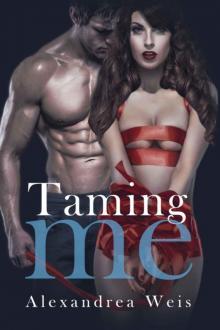 Taming Me
Taming Me Acadian Waltz
Acadian Waltz That Night with You
That Night with You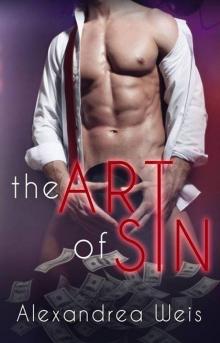 The Art of Sin
The Art of Sin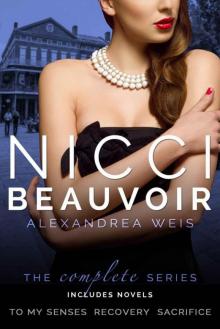 The Nicci Beauvoir Collection: The Complete Nicci Beauvoir Series
The Nicci Beauvoir Collection: The Complete Nicci Beauvoir Series Sacrifice
Sacrifice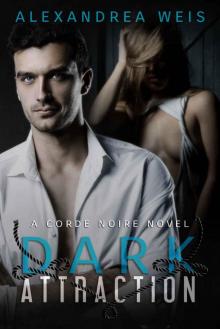 Dark Attraction: The Corde Noire Series
Dark Attraction: The Corde Noire Series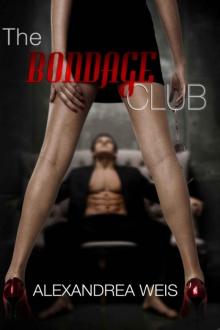 The Bondage Club
The Bondage Club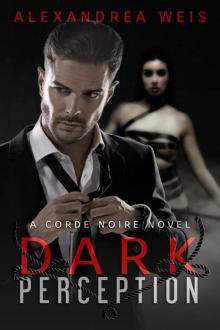 Dark Perception: The Corde Noire Series
Dark Perception: The Corde Noire Series